9781945186240
You also want an ePaper? Increase the reach of your titles
YUMPU automatically turns print PDFs into web optimized ePapers that Google loves.
with which he addresses these questions. It may be worthwhile, however, to<br />
draw attention to one pattern of thought that is central to the philosophy of<br />
the Meditations (as well as to Epictetus), and that has been identified and<br />
documented in detail by Pierre Hadot. This is the doctrine of the three<br />
“disciplines”: the disciplines of perception, of action and of the will.<br />
The discipline of perception requires that we maintain absolute<br />
objectivity of thought: that we see things dispassionately for what they are.<br />
Proper understanding of this point requires a brief introduction to the Stoic<br />
theory of cognition. We have seen that for the Stoics universal order is<br />
represented by the logos. The logos infuses and is wielded by our<br />
hegemonikon (literally, “that which guides”), which is the intellective part<br />
of our consciousness. In different contexts it can approximate either “will”<br />
or “character” and it performs many of the functions that English speakers<br />
attribute to the brain or the heart. 4 One of its primary functions is to process<br />
and assess the data we receive from our senses. At every instant the objects<br />
and events in the world around us bombard us with impressions. As they do<br />
so they produce a phantasia, a mental impression. From this the mind<br />
generates a perception (hypolepsis), which might best be compared to a<br />
print made from a photographic negative. Ideally this print will be an<br />
accurate and faithful representation of the original. But it may not be. It<br />
may be blurred, or it may include shadow images that distort or obscure the<br />
original.<br />
Chief among these are inappropriate value judgments: the designation<br />
as “good” or “evil” of things that in fact are neither good nor evil. For<br />
example, my impression that my house has just burned down is simply that<br />
—an impression or report conveyed to me by my senses about an event in<br />
the outside world. By contrast, my perception that my house has burned<br />
down and I have thereby suffered a terrible tragedy includes not only an<br />
impression, but also an interpretation imposed upon that initial impression<br />
by my powers of hypolepsis. It is by no means the only possible<br />
interpretation, and I am not obliged to accept it. I may be a good deal better<br />
off if I decline to do so. It is, in other words, not objects and events but the<br />
interpretations we place on them that are the problem. Our duty is therefore<br />
to exercise stringent control over the faculty of perception, with the aim of<br />
protecting our mind from error.<br />
The second discipline, that of action, relates to our relationship with<br />
other people. Human beings, for Marcus as for the Stoics generally, are


